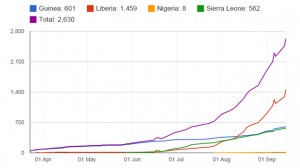On March 15, 2011 an armed conflict began between forces loyal to the government of Syria’s leader, President Bashar Al-Assad, and those seeking to oust him. This conflict, which is still ongoing, started as part of a group of demonstrations in the Middle East in 2011 known as the Arab Spring. The demonstrations in Syria have grown into a crisis and ultimately into civil war that has led to over 191,000 casualties since August 2014[1]. Out of this difficult and complex war with many groups inter-fighting, rose ISIS.
ISIS is a Sunni extremist group, which seeks to unify parts of Iraq and Syria under an Islamic state, referred to as a Sunni Caliphate. Its acronym, therefore, stands for Islamic State in Iraq and Syria. In June 2014, the group surprised the West when it announced itself as a formal Islamic State and proclaimed its leader Abu Bakr al-Baghdadi[2]. As of August 2014, ISIS is believed to control between 13,000 and 35,000 square miles of land, 1,922 people have been killed and 2,610 injured in one month. They have between 30,000 to 50,000 militants fighting for them as many former Iraqi soldiers have been forced to join. How might they finance all of this? ISIS currently has $2,000,000,000 USD in cash and assets, which they acquired through looting from the Iraqi state back and military, and they make a daily revenue of $3,000,000[3].
World leaders have deemed ISIS a terrorist organization, even al-Qaida, a terrorist group famous for the 9/11 attacks, has deemed ISIS too radical [4]. In an attempt to halt ISIS, Obama made an announcement on September 10, 2014, which stated, “the United States will join with our friends and allies to degrade, and ultimately destroy the terrorist group”. The main tactic of international cooperation against ISIS has been air strikes[5].
Headlines broke on September 25, 2014 when it became known that a female pilot, Maj Mariam Al Mansouri, form the United Arab Emirates led the airstrikes against ISIS. Why is this so significant? In the last few months of ISIS violence, women have been a special target group of the organization. At least 300 Yazidi women have been taken as slaves, and many prominent woman activists have been executed by ISIS, such as Sameera Ali al-Nuiaimy, who is an Iraqi lawyer promoting women’s rights, and three female candidates running for election in the Nineveh providence [6]. ISIS regards woman as trophies and has a policy of violence and kidnapping them. It has even considered the idea of female genital mutilation[7]. Not only are ISIS’ views abhorrent towards woman, but it is also an insult to the Islamic law they claim to represent.
Why then is Major Mariam Al Mansouri’s leadership in international airstrikes so important? I believe that the fact that a woman is leading air attacks on an organization that actively aims to reduce the status and value of women is significant. Mansouri’s leadership does not make up for all the lost lives and all the women who have been abused and humiliated, but it is a strong symbolic stance. Not only for women, but for Islam as well. Yousef Al Otabia, the current United Arab Emirate Ambassador to the United States said, “she is a fully qualified, highly trained, combat ready pilot, and she led the mission. It is important for us—moderate Arabs, moderate Muslims—to step up and say this (ISIS) is a threat against us. This is more than just a threat against us than it is against you. This is not just a threat to our countries. This is a threat to our way of life”[8].
The conducting of air strikes by a woman is symbolically significant as ISIS is being weakened by a group it is oppressing: women.
[1] http://www.nytimes.com/2014/08/23/world/middleeast/un-raises-estimate-of-dead-in-syrian-conflict-to-191000.html
[2] http://news.harvard.edu/gazette/story/2014/08/the-rise-of-isis/
[3] http://www.huffingtonpost.com/2014/08/11/isis-iraq-numbers_n_5659239.html
[4] http://www.theguardian.com/world/2014/jun/11/isis-too-extreme-al-qaida-terror-jihadi
[5] http://www.washingtonpost.com/politics/lawmakers-weigh-giving-obama-authority-to-wage-war-against-islamic-state/2014/09/10/59f057b0-38fd-11e4-8601-97ba88884ffd_story.html
[6] http://www.huffingtonpost.com/2014/08/11/isis-iraq-numbers_n_5659239.html, http://www.nytimes.com/2014/09/26/world/middleeast/womens-rights-activist-executed-by-islamic-state-in-iraq.html?ref=world&_r=0
[7] http://www.wilsoncenter.org/sites/default/files/barbarians_isis_mortal_threat_women_1.pdf
[8] http://www.cnn.com/2014/09/25/world/meast/uae-female-fighter-pilot/index.html?hpt=hp_c2
